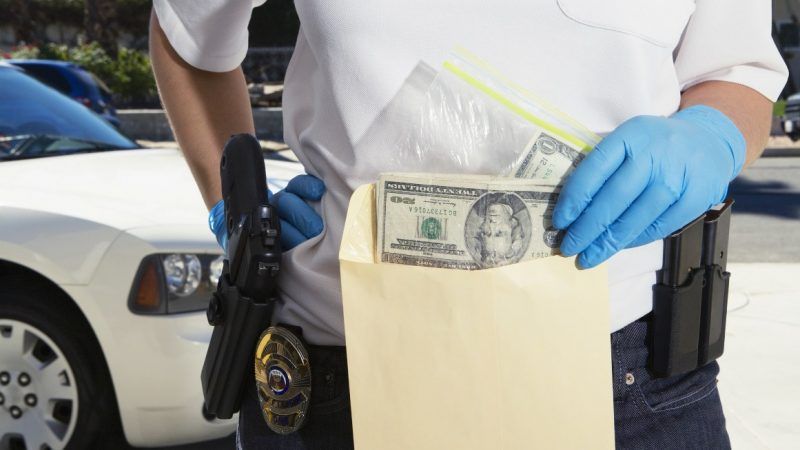Lancaster County Drug Task Force 'Missing' $150K From Asset Forfeiture Fund
Would you be surprised if you learned the former district attorney was caught leasing an SUV with asset forfeiture funds?

A drug task force in Lancaster County, Pennsylvania, is missing roughly $150,000 in seized cash in what "appears in every aspect to be an internal theft," the local district attorney said Monday.
Lancaster County District Heather Adams announced at a press conference that an audit of the Lancaster County Drug Task Force revealed that someone has stolen up to $150,000 from the task force's asset forfeiture fund.
Under civil asset forfeiture laws, police and prosecutors can seize property—cash, cars, houses—suspected of being connected to criminal activity, even if the owner isn't charged or convicted of a crime. Law enforcement groups say asset forfeiture is a vital tool to disrupt drug trafficking and other organized crime. However, civil liberties groups say that it creates perverse profit incentives for police.
"One has to wonder whether that $150,000 discrepancy contributed to the former DA's unwillingness to comply with [local news outlet] LNP's requests for the task force's detailed forfeiture records," says Jennifer McDonald, a senior research analyst at the Institute for Justice. "Behavior like this is exactly why forfeiture transparency practices are so important."
LNP and the Institute for Justice, a libertarian-leaning public interest law firm that has challenged forfeiture laws in several states, fought a public records lawsuit against former Lancaster County District Attorney Craig Stedman after his office refused to turn over asset forfeiture records.
Stedman was caught using asset forfeiture revenues intended for drug enforcement to lease a 2016 Toyota Highlander.
In July 2019, LNP reported that undercover drug task force officers paid for sex acts during prostitution investigations.
Adams, the current district attorney, took office in January after running on a platform that included increasing transparency around the county's asset forfeiture practices. McDonald says most of the records the Institute for Justice and LNP sought have been turned over, but they are still in litigation over certain other records involving forfeiture auctions.
(A 2018 WHYY investigation of auctions of Philadelphia houses seized through asset forfeiture found that several were sold to Philadelphia police officers.)
Lancaster County's mysteriously missing $150,000 is not the first time that large amounts of forfeiture funds have disappeared or have been used as a slush fund for local law enforcement.
This March, Michigan Attorney General Dana Nessel announced that her office was charging Macomb County Prosecutor Eric Smith and three other county officials with a "litany" of felony crimes for embezzling and misusing funds seized through asset forfeiture.
The charges followed a successful public records lawsuit that revealed more than $100,000 in questionable expenditures from Macomb County's asset forfeiture fund. Authorities now estimate the Smith and other officials embezzled roughly $600,000 since 2012.
The Georgia Department of Revenue returned $2.1 million to the state treasury this May after an investigation by The Atlanta Journal-Constitution and Channel 2 Action News revealed that the department spent millions of dollars in forfeiture funds "on engraved firearms, pricey gym equipment, clothing, personal items, even $130 sunglasses."
In Illinois, former La Salle County State's Attorney Brian Towne faced criminal charges for misconduct and misappropriating public funds after he allegedly spent asset forfeiture funds on an SUV, WiFi for his home, and local youth sports programs. Town created his own highway interdiction unit and asset forfeiture fund for his office—a move the Illinois Supreme Court later ruled was illegal. The case against Towne was dismissed last year after a judge ruled his right to a speedy trial had been violated.
A 2016 Department of Justice Office of Inspector General audit found that an Illinois police department spent more than $20,000 in equitable sharing funds on accessories for two lightly used motorcycles, including after-market exhaust pipes, decorative chrome, and heated handgrips.
Adams said she has referred the case to the Pennsylvania Attorney General for investigation.


Show Comments (20)